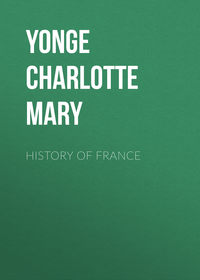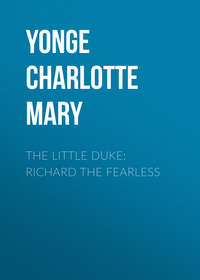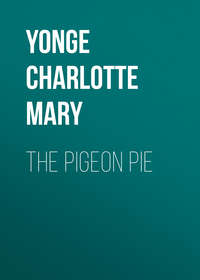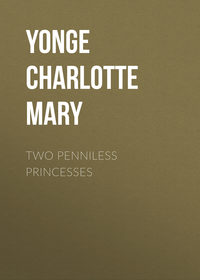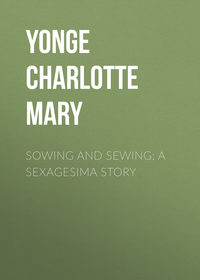
Chantry House
CHAPTER XII
MRS. SOPHIA’S FEUD
‘O’er all there hung the shadow of a fear, A sense of mystery the spirit daunted,And said as plain as whisper in the ear, The place is haunted.’—Hood.We had a houseful at Christmas. The Rev. Charles Henderson, a Fellow of Trinity College, Oxford, lately ordained a deacon, had been recommended to us by our London vicar, and was willing not only to take charge of the parish, but to direct my studies, and to prepare Martyn for school. He came to us for the Christmas vacation to reconnoitre and engage lodgings at a farmhouse. We liked him very much—my mother being all the better satisfied after he had shown her a miniature, and confided to her that the original was waiting till a college living should come to him in the distant future.
Admiral Griffith could not tear himself from his warm rooms and his club, but our antiquarian friend, Mr. Stafford, came with his wife, and revelled in the ceilings of the mullion room, where he would much have liked to sleep, but that its accommodations were only fit for a bachelor.
Our other visitor was Miss Selby, or rather Mrs. Sophia Selby, as she designated herself, according to the becoming fashion of elderly spinsters, which to my mind might be gracefully resumed. It irked my father to think of the good lady’s solitary Christmas at Bath, and he asked her to come to us. She travelled half-way in a post-chaise, and then was met by the carriage. A very nice old lady she was, with a meek, delicate babyish face, which could not be spoilt by the cap of the period, one of the most disfiguring articles of head gear ever devised, though nobody thought so then. She was full of kindness; indeed, if she had a fault it was the abundant pity she lavished on me, and her determination to amuse me. The weather was of the kind that only the healthy and hardy could encounter, and when every one else was gone out, and I was just settling in with a new book, or an old crabbed Latin document, that Mr. Stafford had entrusted to me to copy out fairly and translate, she would glide in with her worsted work on a charitable mission to enliven poor Mr. Edward.
However, this was the means of my obtaining some curious enlightenments. A dinner-party was in contemplation, and she was dismayed at the choice of the fashionable London hour of seven, and still more by finding that the Fordyces were to be among the guests. She was too well-bred to manifest her feelings to her hosts, but alone with me, she could not refrain from expressing her astonishment to me, all the more when she heard this was reciprocity for an invitation that it had not been possible to accept. Her poor dear uncle would never hear of intercourse with Hillside. On being asked why, she repeated what Chapman had said, that he could not endure any one connected with Mrs. Hannah More and her canting, humbugging set, as the ungodly old man had chosen to call them, imbuing even this good woman with evil prejudices against their noble work at Cheddar.
‘Besides this, Fordyces and Winslows could never be friends, since the Fordyces had taken on themselves to dispute the will, and say it had been improperly obtained.’
‘What will?’
‘Mrs. Winslow’s—Margaret Fordyce that was. She was the heiress, and had every right to dispose of her property.’
‘But that was more than a hundred years ago!’
‘So it was, my dear; but though the law gave it to us—to my uncle’s grandfather (or great-grandfather, was it?)—those Fordyces never could rest content. Why, one of them—a clergyman’s son too—shot young Philip Winslow dead in a duel. They have always grudged at us. Does your papa know it, my dear Mr. Edward? He ought to be aware.’
‘I do not know,’ I said; ‘but he would hardly care about what happened in the time of Queen Anne.’
It was curious to see how the gentle little lady espoused the family quarrel, which, after all, was none of hers.
‘Well, you are London people, and the other branch, and may not feel as we do down here; but I shall always say that Madam Winslow’s husband’s son had every right to come before her cousin once removed.’
I asked if we were descended from her, for, having a turn for heraldry and genealogy, I wanted to make out our family tree. Mrs. Sophia was ready to hold up her hands at the ignorance of the ‘other branch.’ This poor heiress had lost all her children in their infancy, and bequeathed the estate to her stepson, the Fordyce male heir having been endowed by her father with the advowson of Hillside and a handsome estate there, which Mrs. Selby thought ought to have contented him, ‘but some people never know when they have enough;’ and, on my observing that it might have been a matter of justice, she waxed hotter, declaring that what the Winslows felt so much was the accusation of violence against the poor lady. She spoke as if it were a story of yesterday, and added, ‘Indeed, they made the common people have all sorts of superstitious fancies about the room where she died—that old part of the house.’ Then she added in a low mysterious voice, ‘I hear that your brother Mr. Griffith Winslow could not sleep there;’ and when the rats and the wind were mentioned—‘Yes, that was what my poor dear uncle used to say. He always called it nonsense; but we never had a servant who would sleep there. You’ll not mention it, Mr. Edward, but I could not help asking that very nice housemaid, Jane, whether the room was used, and she said how Mr. Griffith had given it up, and none of the servants could spend a night there when they are sleeping round. Of course I said all in my power to dispel the idea, and told her that there was no accounting for all the noises in old houses; but you never can reason with that class of people.’
‘Did you ever hear the noises, Mrs. Selby?’
‘Oh, no; I wouldn’t sleep there for thousands! Not that I attach any importance to such folly,—my poor dear uncle would never hear of such a thing; but I am such a nervous creature, I should lie awake all night expecting the rats to run over me. I never knew of any one sleeping there, except in the gay times when I was a child, and the house used to be as full as, or fuller than, it could hold, for the hunt breakfast or a ball, and my poor aunt used to make up ever so many beds in the two rooms, and then we never heard of any disturbance, except what they made themselves.’
This chiefly concerned me, because home cosseting had made me old woman enough to be uneasy about unaired beds; and I knew that my mother meant to consign Clarence to the mullion chamber. So, without betraying Jane, I spoke to her, and was answered, ‘Oh, sir, I’ll take care of that; I’ll light a fire and air the mattresses well. I wish that was all, poor young gentleman!’
To the reply that the rats were slaughtered and the wind stopped out, Jane returned a look of compassion; but the subject was dropped, as it was supposed to be the right thing to hush up, instead of fostering, any popular superstition; but it surprised me that, as all our servants were fresh importations, they should so soon have become imbued with these undefined alarms.
My father was much amused at being successor to this family feud, and said that when he had time he would look up the documents.
Mrs. Sophia was a sight when Mr. Fordyce and his son and daughter-in-law were announced; she was so comically stiff between her deference to her hosts and her allegiance to her poor dear uncle; but her coldness melted before the charms of old Mr. Fordyce, who was one of the most delightful people in the world. She even was his partner at whist, and won the game, and that she did like.
Parson Frank, as we naughty young ones called him, was all good-nature and geniality—a thorough clergyman after the ideas of the time, and a thorough farmer too; and in each capacity, as well as in politics, he suited my father or Mr. Henderson. His lady, in a blonde cap, exactly like the last equipment my mother had provided herself with in London, and a black satin dress, had much more style than the more gaily-dressed country dames, and far more conversation. Mr. Stafford, who had dreaded the party, pronounced her a sensible, agreeable woman, and she was particularly kind and pleasant to me, coming and talking over the botany of the country, and then speaking of my brother’s kindness to poor Amos Bell, who was nearly recovered, but was a weakly child, for whom she dreaded the toil of a ploughboy in thick clay with heavy shoes.
I was sorry when, after Emily’s well-studied performance on the piano, Mrs. Fordyce was summoned away from me to sing, but her music and her voice were both of a very different order from ordinary drawing-room music; and when our evening was over, we congratulated ourselves upon our neighbours, and agreed that the Fordyces were the gems of the party.
Only Mrs. Sophia sighed at us as degenerate Winslows, and Emily reserved to herself the right of believing that the daughter was ‘a horrid girl.’
CHAPTER XIII
A SCRAPE
‘Though bound with weakness’ heavy chainWe in the dust of earth remain;Not all remorseful be our tears,No agony of shame or fears,Need pierce its passion’s bitter tide.’Verses and Sonnets.Perhaps it was of set purpose that our dinner-party had been given before Clarence’s return. Griffith had been expected in time for it, but he had preferred going by way of London to attend a ball given by the daughter of a barrister friend of my father’s. Selina Clarkson was a fine showy girl, with the sort of beauty to inspire boyish admiration, and Griff’s had been a standing family joke, even my father condescending to tease him when the young lady married Sir Henry Peacock, a fat vulgar old man who had made his fortune in the commissariat, and purchased a baronetcy. He was allowing his young wife her full swing of fashion and enjoyment. My mother did not think it a desirable acquaintance, and was restless until both the brothers came home together, long after dark on Christmas Eve, having been met by the gig at the corner where the coach stopped. The dinner-hour had been put off till half-past six, and we had to wait for them, the coach having been delayed by setting down Christmas guests and Christmas fare. They were a contrast; Griffith looking very handsome and manly, all in a ruddy glow from the frosty air, and Clarence, though equally tall, well-made, and with more refined features, looked pale and effaced, now that his sailor tan was worn off. The one talked as eagerly as he ate, the other was shy, spiritless, and with little appetite; but as he always shrank into himself among strangers, it was the less wonder that he sat in his drooping way behind my sofa, while Griffith kept us all merry with his account of the humours of the ‘Peacock at home;’ the lumbering efforts of old Sir Henry to be as young and gay as his wife, in spite of gout and portliness; and the extreme delight of his lady in her new splendours—a gold spotted muslin and white plumes in a diamond agraffe. He mimicked Sir Henry’s cockneyisms more than my father’s chivalry approved towards his recent host, as he described the complaints he had heard against ‘my Lady being refused the hentry at Halmack’s, but treated like the wery canal;’ and how the devoted husband ‘wowed he would get up a still more hexclusive circle, and shut hout these himpertinent fashionables who regarded Halmack’s as the seventh ’eaven.’
My mother shook her head at his audacious fun about Paradise and the Peri, but he was so brilliant and good-humoured that no one was ever long displeased with him. At night he followed when Clarence helped me to my room, and carefully shutting the door, Griff began. ‘Now, Teddy, you’re always as rich as a Jew, and I told Bill you’d help him to set it straight. I’d do it myself, but that I’m cleaned out. I’d give ten times the cash rather than see him with that hang-dog look again for just nothing at all, if he would only believe so and be rational.’
Clarence did look indescribably miserable while it was explained that he had been commissioned to receive about £20 which was owing to my father, and to discharge therewith some small debts to London tradesmen. All except the last, for a little more than four pounds, had been paid, when Clarence met in the street an old messmate, a good-natured rattle-pated youth,—one of those who had thought him harshly treated. There was a cordial greeting, and an invitation to dine at once at a hotel, where they were joined by some other young men, and by and by betook themselves to cards, when my poor brother’s besetting enemy prevented him from withdrawing when he found the points were guineas. Thus he lost the remaining amount in his charge, and so much of his own that barely enough was left for his journey. His salary was not due till Lady Day; Mr. Castleford was in the country, and no advances could be asked from Mr. Frith. Thus Griff had found him in utter despair, and had ever since been trying to cheer him and make light of his trouble. If I advanced the amount, which was no serious matter to me, Clarence could easily get Peter to pay the bill, and if my father should demand the receipt too soon, it would be easy to put him off by saying there had been a delay in getting the account sent in.
‘I couldn’t do that,’ said Clarence.
‘Well, I should not have thought you would have stuck at that,’ returned Griff.
‘There must be no untruth,’ I broke in; ‘but if without that, he can avoid getting into a scrape with papa—’
Clarence interrupted in the wavering voice we knew so well, but growing clearer and stronger.
‘Thank you, Edward, but—but—no, I can’t. There’s the Sacrament to-morrow.’
‘Oh—h!’ said Griff, in an indescribable tone. But he will never believe you, nor let you go.’
‘Better so,’ said Clarence, half choked, ‘than go profanely—deceiving—or not knowing whether I shall—’
Just then we heard our father wishing the other gentlemen good-night, and to our surprise Clarence opened the door, though he was deadly white and with dew starting on his forehead.
My father turned good-naturedly. ‘Boys, boys, you are glad to be together, but mamma won’t have you talking here all night, keeping her baby up.’
‘Sir,’ said Clarence, holding by the rail of the bed, ‘I was waiting for you. I have something to tell you—’
The words that followed were incoherent and wrong end foremost; nor had many, indeed, been uttered before my father cut them short with—
‘No false excuses, sir; I know you too well to listen. Go. I have ceased to hope for anything better.’
Clarence went without a word, but Griff and I burst out with entreaties to be listened to. Our father thought at first that ours were only the pleadings of partiality, and endeavours to shield the brother we both so heartily loved; but when he understood the circumstances, the real amount of the transgression, and Clarence’s rejection of our united advice and assistance to conceal it, he was greatly touched and softened. ‘Poor lad! poor fellow!’ he muttered, ‘he is really doing his best. I need not have cut him so short. I was afraid of more falsehoods if I let him open his mouth. I’ll go and see.’
He went off, and we remained in suspense, Griff observing that he had done his best, but poor Bill always would be a fool, and that no one who had not always lived at home like me would have let out that we had been for the suppression policy. As I was rather shocked, he went off to bed, saying he should look in to see what remained of Clarence after the pelting of the pitiless storm he was sure to bring on himself by his ridiculous faltering instead of speaking out like a man.
I longed to have been able to do the same, but my father kindly came back to relieve my mind by telling me that he was better satisfied about Clarence than ever he had been before. When encouraged to speak out, the narrative of the temptation had so entirely agreed with what we had said as to show there had been no prevarication, and this had done more to convince my father that he was on the right track than the having found him on his knees. He had had a patient hearing, and thus was able to command his nerves enough to explain himself, and it had ended in my father giving entire forgiveness for what, as Griff truly said, would have been a mere trifle but for the past. The voluntary confession had much impressed my father, and he could not help adding a word of gentle reproof to me for having joined in aiding him to withhold it, but he accepted my explanation and went away, observing, ‘By the by, I don’t wonder at what Griffith says of that room; I never heard such strange effects of currents of air.’
Clarence was in my room before I was drest, full of our father’s ‘wonderful goodness’ to him. He had never experienced anything like it, he said. ‘Why! he really seemed hopeful about me,’ were words uttered with a gladness enough to go to one’s heart. ‘O Edward, I feel as if there was some chance of “steadfastly purposing” this time.’
It was not the way of the family to say much of religious feeling, and this was much for Clarence to utter. He looked white and tired, but there was an air of rest and peace about him, above all when my mother met him with a very real kiss. Moreover, Mr. Castleford had taken care to brighten our Christmas with a letter expressive of great satisfaction with Clarence for steadiness and intelligence. Even Mr. Frith allowed that he was the most punctual of all those young dogs.
‘I do believe,’ said my father, ‘that his piety is doing him some good after all.’
So our mutual wishes of a happy Christmas were verified, though not much according to the notions of this half of the century. People made their Christmas day either mere merriment, or something little different from the grave Sunday of that date. And ours, except for the Admiral’s dining with us, had always been of the latter description, all the more that when celebrations of the Holy Communion were so rare they were treated with an awe and reverence which frequency has perhaps diminished, and a feeling (possibly Puritanical) prevailed which made it appear incongruous to end with festivity a day so begun. That we had a Christmas Day Communion at all at Earlscombe was an innovation only achieved by Mr. Henderson going to assist the old Rector at Wattlesea; and there were no communicants except from our house, besides Chapman, his daughter-in-law, and five old creatures between whom the alms were immediately divided. We afterwards learnt that our best farmer and his wife were much disappointed at the change from Sunday interfering with the family jollification; and Mrs. Sophia Selby was annoyed at the contradiction to her habits under the rule of her poor dear uncle.
Of the irregularities, irreverences, and squalor of the whole I will not speak. They were not then such stumbling-blocks as they would be now, and many passed unperceived by us, buried as we were in our big pew, with our eyes riveted on our books; yet even thus there was enough evident to make my mother rejoice that Mr. Henderson would be with us before Easter. Still this could not mar the thankful gladness that was with us all that day, and which shone in Clarence’s eyes. His countenance always had a remarkable expression in church, as if somehow his spirit went farther than ours did, and things unseen were more real to him.
Hillside, as usual, had two services, and my father and his friend were going to walk thither in the afternoon, but it was a raw cold day, threatening snow, and Emily was caught by my mother in the hail and ordered back, as well as Clarence, who had shown symptoms of having caught cold on his dismal journey. Emily coaxed from her permission to have a fire in the bookroom, and there we three had a memorably happy time. We read our psalms and lessons, and our Christian Year, which was more and more the lodestar of our feelings. We compared our favourite passages, and discussed the obscurer ones, and Clarence was led to talk out more of his heart than he had ever shown to us before. Perhaps he had lost some of his reserve through his intercourse with our good old governess, Miss Newton, who was still grinding away at her daily mill, though with somewhat failing eyesight, so that she could do nothing but knit in the long evenings, and was most grateful to her former pupil for coming, as often as he could, to talk or read to her.
She was a most excellent and devout woman, and when Emily, who in youthful gaieté de cœur had got a little tired of her, exclaimed at his taste, and asked if she made him read nothing but Pike’s Early Piety, he replied gravely, ‘She showed me where to lay my burthen down,’ and turned to the two last verses of the poem for ‘Good Friday’ in the Christian Year, as well as to the one we had just read on the Holy Communion.
My father’s kindness had seemed to him the pledge of the Heavenly Father’s forgiveness; and he added, perhaps a little childishly, that it had been his impulse to promise never to touch a card again, but that he dreaded the only too familiar reply, ‘What availed his promises?’
‘Do promise, Clarry!’ cried Emily, ‘and then you won’t have to play with that tiresome old Mrs. Sophia.’
‘That would rather deter me,’ said Clarence good-humouredly.
‘A card-playing old age is despicable,’ pronounced Miss Emily, much to our amusement.
After that we got into a bewilderment. We knew nothing of the future question of temperance versus total abstinence; but after it had been extracted that Miss Newton regarded cards as the devil’s books, the inconsistent little sister changed sides, and declared it narrow and evangelical to renounce what was innocent. Clarence argued that what might be harmless for others might be dangerous for such as himself, and that his real difficulty in making even a mental vow was that, if broken, there was an additional sin.
‘It is not oneself that one trusts,’ I said.
‘No,’ said Clarence emphatically; ‘and setting up a vow seems as if it might be sticking up the reed of one’s own word, and leaning on that—when it breaks, at least mine does. If I could always get the grasp of Him that I felt to-day, there would be no more bewildered heart and failing spirit, which are worse than the actual falls they cause.’ And as Emily said she did not understand, he replied in words I wrote down and thought over, ‘What we are is the point, more than even what we do. We do as we are; and yet we form ourselves by what we do.’
‘And,’ I put in, ‘I know somebody who won a victory last night over himself and his two brothers. Surely doing that is a sign that he is more than he used to be.’
‘If he were, it would not have been an effort at all,’ said Clarence, but with his rare sweet smile.
Just then Griff called him away, and Emily sat pondering and impressed. ‘It did seem so odd,’ she said, ‘that Clarry should be so much the best, and yet so much the worst of us.’
I agreed. His insight into spiritual things, and his enjoyment of them, always humiliated us both, yet he fell so much lower in practice,—‘But then we had not his temptations.’
‘Yes,’ said Emily; ‘but look at Griff! He goes about like other young men, and keeps all right, and yet he doesn’t care about religious things a bit more than he can help.’
It was quite true. Religion was life to the one and an insurance to the other, and this had been a mystery to us all our young lives, as far as we had ever reflected on the contrast between the practical failure and success of each. Our mother, on the other hand, viewed Clarence’s tendencies as part of an unreal, self-deceptive nature, and regretted his intimacy with Miss Newton, who, she said, had fostered ‘that kind of thing’ in his childhood—made him fancy talk, feeling, and preaching were more than truth and honour—and might lead him to run after Irving, Rowland Hill, or Baptist Noel, about whose tenets she was rather confused. It would be an additional misfortune if he became a fanatical Evangelical light, and he was just the character to be worked upon.
My father held that she might be thankful for any good influence or safe resort for a young man in lodgings in London, and he merely bade Clarence never resort to any variety of dissenting preacher. We were of the school called—a little later—high and dry, but were strictly orthodox according to our lights, and held it a prime duty to attend our parish church, whatever it might be; nor, indeed, had Clarence swerved from these traditions.




